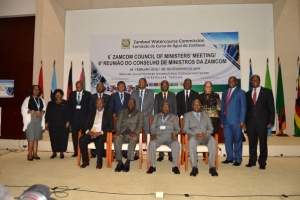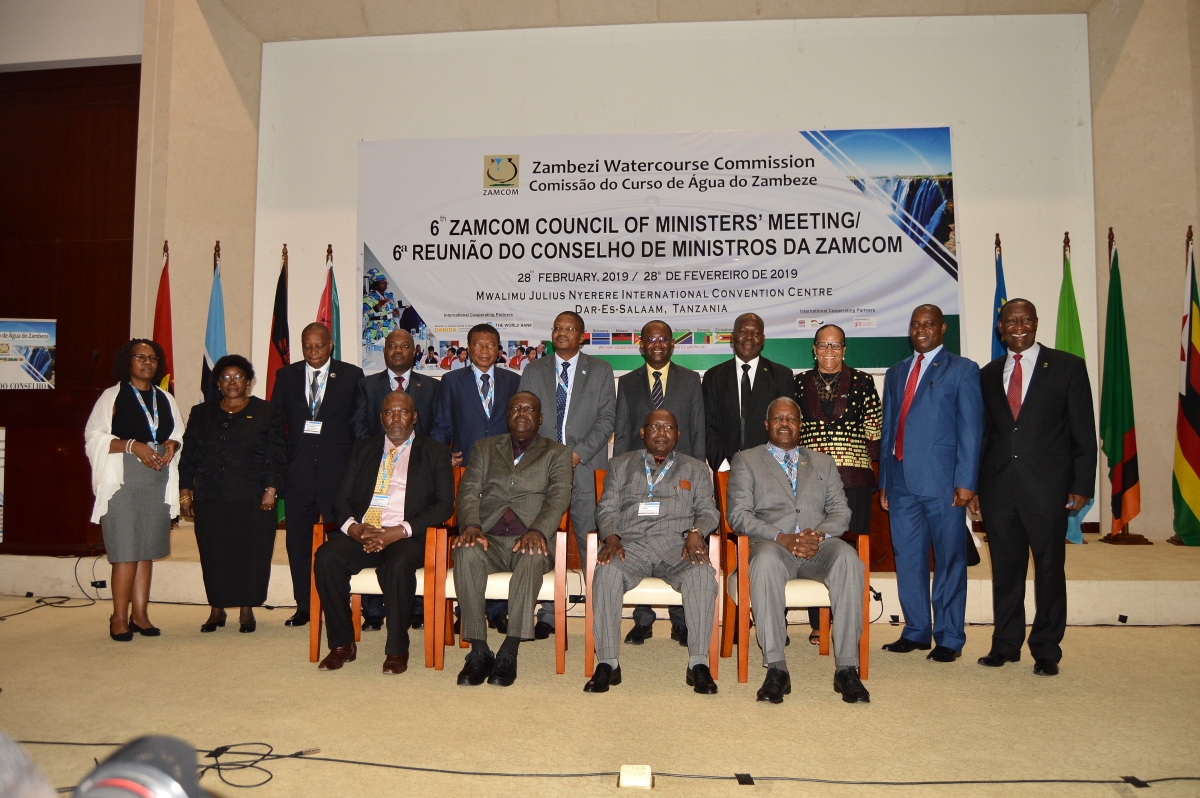
 The Zambezi Watercourse Commission (ZAMCOM)’s top governing body - the Council of Ministers - approved two major projects for the organization at its 6th sitting in Dar es Salaam, Tanzania. These are the Strategic Plan for the Zambezi Watercourse (ZSP) and the Zambezi Water Resources Information System – Decision Support System (ZAMWIS-DSS).
The Zambezi Watercourse Commission (ZAMCOM)’s top governing body - the Council of Ministers - approved two major projects for the organization at its 6th sitting in Dar es Salaam, Tanzania. These are the Strategic Plan for the Zambezi Watercourse (ZSP) and the Zambezi Water Resources Information System – Decision Support System (ZAMWIS-DSS).This advancement opens up a new era in the development and management of the Zambezi Watercourse and takes ZAMCOM organization to another level of operation – that of discharging its functions through application of these tools and outputs derived from the two support projects and others.
“The attainment of the ZSP and the ZAMWIS-DSS will enable us, as the ZAMCOM Secretariat, to work with Riparian States in ensuring effective delivery of the ZAMCOM Objective on the ground, that is to ‘promote the equitable and reasonable utilization of the water resources of the Zambezi Watercourse as well as the efficient management and sustainable development thereof’, said Michael Mutale, ZAMCOM Executive Secretary.
The Strategic Plan is a planning tool that will enhance countries sharing the Zambezi Watercourse appreciate the benefits of cooperation in a shared entity.
“Ideally, the Strategic Plan is a fundamental framework for facilitating investments there in to address Zambezi Watercourse development challenges. It is also a step in the right direction in realising benefits of cooperation in the Zambezi Watercourse that will unlock enormous development potential,” said Evans Kaseke, ZAMCOM Programme Manager for Strategic Planning.
The ZAMWIS-DSS, on the other hand, as Hastings Chibuye, Programme Manager for ZAMWIS said, will advance regional cooperation among the Riparian States of the Zambezi Watercourse through data and information sharing. “In addition, the ZAMWIS-DSS will serve as a common data and information reference point for thorough decision-making, in as far as the development and management of water resources of the shared Zambezi Watercourse is concerned,” he noted.
The ZAMCOM Council of Ministers meeting which took place in Dar es Salaam, Tanzania on 28 February, 2019 also took stock of what the river basin organization, shared by eight Southern African countries has achieved, four years after the establishment of its permanent Secretariat in Harare, Zimbabwe.
The Ministers’ meeting was preceded by that of the ZAMCOM Technical Committee (ZAMTEC) on 26 and 27 February, 2019. The ZAMCOM Council of Ministers meeting is an annual event held mainly around February to, among other things, adopt and provide policy guidance or approve recommendations from ZAMTEC, besides assessing performance progress of the organisation. The ZAMCOM Council of Ministers is the supreme body of the organization while the ZAMTEC is tasked with implementing policies and decisions of the Council. The ZAMCOM Secretariat (ZAMSEC) provides technical and administrative services to Council under the supervision of ZAMTEC.
ZAMCOM was established through the ZAMCOM Agreement reached by the eight Riparian States that share the Zambezi Watercourse. The organisation is mandated to promote and coordinate the cooperative management and development of the Zambezi Watercourse in a sustainable, climate resilient manner. The eight Riparian States include: Republic of Angola; Republic of Botswana; Republic of Malawi, Republic of Mozambique; Republic of Namibia; United Republic of Tanzania; Republic of Zambia and Republic of Zimbabwe.
The ZAMCOM agreement was signed in 2004 at Kasane in Botswana and came into force in 2011. Its Permanent Secretariat is hosted by the Government of the Republic of Zimbabwe.
During the two meetings, other items discussed included progress made in the implementation of the ZAMCOM’s core activities, that is: the ZAMCOM 2019/20 Work Plan and Budget; and ZAMCOM Council decisions from the meeting held in 2018. Some of ZAMCOM’s achievements to-date, apart from the two major projects, include: - development of Rules and Procedures for sharing of data and information related to the management and development of the Zambezi Watercourse; - development of Procedures for Notification of Planned Measures; - completion of a Legal Equivalence Study; - completion of the ZAMCOM Capacity Building Needs Assessment Study and development of Capacity Development and Implementation Plan; and - development of a ZAMCOM Gender Mainstreaming Strategy. ZAMCOM is financially supported by the Riparian States and a number of International Cooperating Partners (ICPs) that include: the Danish Government through its Ministry of Foreign Affairs International Development Cooperation (DANIDA); the World Bank (WB) through Cooperation in International Waters in Africa (CIWA); and Deutsche Gesellschaft für Internationale Zusammenarbeit GmbH or GIZ, in short.
End//////
For more information, kindly call the ZAMCOM Secretariat, 128 Samora Machel Avenue, Harare; Tel: +263 242 253361/2/3; Voip: 08677000313 or send an email to zamcom@zambezicommission.org. Also visit the ZAMCOM website: www.zambezicommission.org.
